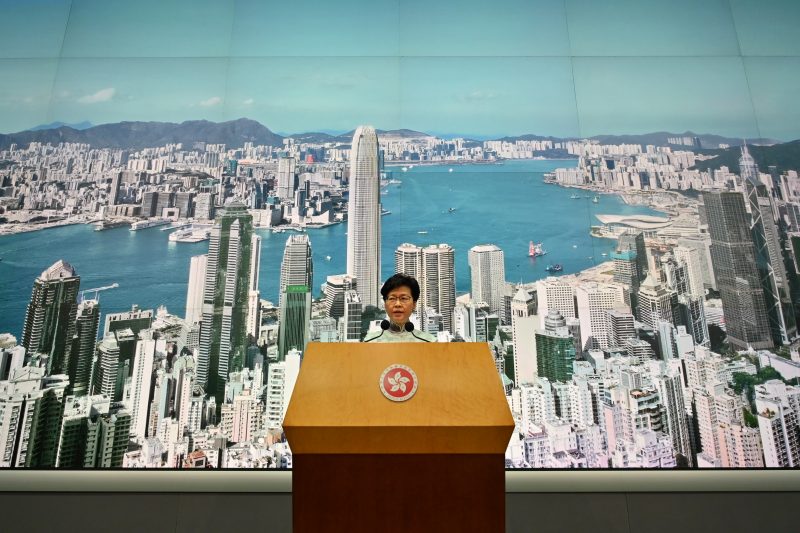Hong Kong leader suspends extradition bill after huge protests
Hong Kong leader Carrie Lam backtracked after a major public backlash (HECTOR RETAMAL)
Hong Kong (AFP) – Hong Kong’s embattled leader on Saturday suspended a hugely divisive bill that would allow extraditions to China in a major climbdown after a week of unprecedented protests and political unrest.
The international finance hub was rocked by the worst political violence since its 1997 handover to China on Wednesday as tens of thousands of protesters were dispersed by riot police firing tear gas and rubber bullets.
Those clashes came three days after chief executive Carrie Lam refused to be budged by a record-breaking rally in which organisers said more than a million people marched through the streets calling for the bill to be scrapped.
After days of mounting pressure — including from her own allies — Lam relented on Saturday, announcing that work on the bill would be halted with no deadline set for its introduction.
The decision is a rare concession from the city’s pro-Beijing leaders who have successfully faced down demands from pro-democracy demonstrators in recent years.
But opponents said it did not go far enough and vowed to press ahead with a planned mass rally on Sunday.
Lam — who is appointed by a committee stacked with Beijing loyalists — said she had no plans to step down, and defended the need to overhaul the city’s extradition laws and retained the support of China’s central government.
But she admitted her team had misjudged the public mood.
“I feel deep sorrow and regret that the deficiencies in our work and various other factors have stirred up substantial controversies and disputes in society following the relatively calm periods of the past two years,” she said.
Protest organisers said they would only accept a complete scrapping of the bill and a promise not to reintroduce it to the city’s parliament.
“Carrie Lam has lost all credibility amongst the Hong Kong people, she must step down,” pro-democracy lawmaker Claudia Mo told reporters.
“She stays on, we stay on,” Mo added, referencing the planned protest.
Jason Ng, from the Progressive Lawyers Group, said Lam’s announcement “fell short” of protester demands.
“Furthermore, she has refused to take responsibility for the excessive police force unleashed on protesters and for tearing society asunder,” he told AFP.
“This is unlikely to mollify civil society and we are expecting another big turnout at the march tomorrow.”
– Surge of public anger –
Opposition to the Beijing-backed bill united an unusually wide cross-section of Hong Kong from influential legal and business bodies, to religious leaders, western nations and the huge crowds hitting the streets.
Critics feared the law would tangle people up in China’s notoriously opaque and politicised courts as well as hammer the city’s reputation as a safe business hub.
But the furore was also the latest expression of public anger over fears that an increasingly assertive Beijing is stamping down on the city’s freedoms and unique culture.
Under a deal signed with Britain, China allowed Hong Kong to keep key liberties denied to people on the mainland, like freedom of speech and independent courts, for 50 years.
But critics accuse Beijing of reneging on that deal with the complicity of the city’s unelected leaders.
They point to the huge 2014 pro-democracy “Umbrella Movement” that failed to win any concessions, the imprisonment of protest leaders and the banning of some critics from standing for election, as recent examples.
The writing on the wall began to emerge for Lam on Friday when she found herself facing growing calls from within her own political camp to reverse course and tamp down spiralling public anger — including from hardline pro-Beijing lawmakers.
“Shouldn’t (we) cool the citizens down?” Ann Chiang, a hardcore pro-Beijing lawmaker, told i-Cable News.
– Beijing’s ‘scapegoat’ –
Beijing had vocally supported the bill and earlier this week threw its full support behind the Lam administration, calling protesters “rioters”.
But it has since sought to distance itself with China’s envoy to Britain saying the idea for the bill came entirely from the Lam administration.
Hong Kong-based political analyst Willy Lam said there had been a growing unease among Beijing’s leaders as the unrest spiralled.
“The opposition to the bill now includes powerful members of the business community, former senior civil servants and the foreign business community — so I think Xi Jinping is under heavy pressure to postpone the bill, and the scapegoat will be Carrie Lam,” he told AFP before Lam’s announcement.
On Friday night, thousands of parents gathered in a park in the heart of the city’s commercial district to condemn the use of rubber bullets and tear gas against predominantly young protesters on Wednesday.
Disclaimer: Validity of the above story is for 7 Days from original date of publishing. Source: AFP.


